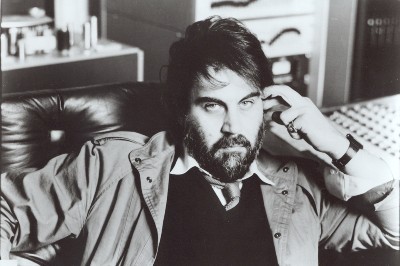
Vangelis: A Pioneer of Electronic and Cinematic Music
Vangelis, born Evángelos Odysséas Papathanassíou on March 29, 1943, in Agria, Greece, was a pioneering composer whose music transcended the boundaries of traditional genres. He gained global recognition for his synthesizer-driven compositions, particularly in the realms of electronic music and film scoring.
Throughout his six-decade career, Vangelis left an indelible mark on music, seamlessly blending technology and artistry to create evocative soundscapes that resonated with audiences worldwide. His most iconic works, including the scores for Chariots of Fire and Blade Runner, are often cited as quintessential examples of how electronic music can shape and enhance storytelling. However, Vangelis’ legacy extends far beyond his work in cinema. His wide-ranging explorations of classical, ambient, and experimental music demonstrate his versatility and enduring influence.
Early Life and Musical Beginnings
Vangelis showed an early aptitude for music, starting to experiment with sound from the age of four. Remarkably, despite his later fame as a master of musical composition, Vangelis never received formal training in traditional music theory or notation. Instead, he developed a unique, intuitive approach to music, focusing on emotion and instinct rather than academic structure. As a child, he was fascinated by the natural world and often sought to replicate the sounds of nature through his piano and makeshift instruments. This connection to nature and his ability to transform external stimuli into musical expression would become central themes in his work.
In his teenage years, Vangelis became involved with local pop and rock bands, and by the 1960s, he co-founded the progressive rock band Aphrodite’s Child, which gained commercial success across Europe. With Demis Roussos as the lead vocalist and Vangelis handling the keyboards, the group produced a number of hits, including their third album 666, a concept album based on the Book of Revelation. This record, released in 1972, hinted at Vangelis’ future inclinations towards complex, layered compositions that fused rock, orchestral, and experimental electronic elements.
Transition to Solo Career
After the dissolution of Aphrodite’s Child in the early 1970s, Vangelis embarked on a solo career, moving to Paris and establishing his own recording studio. It was during this period that he began to experiment more deeply with synthesizers, particularly the Yamaha CS-80, which would become a signature element of his sound. The instrument’s expressive qualities allowed Vangelis to manipulate sound in real-time, giving him the freedom to create dynamic, flowing compositions that were heavily influenced by classical music but executed with modern electronic techniques.
His early solo albums, including Earth (1973) and Heaven and Hell (1975), showcased his developing style, blending rock, symphonic, and electronic music in innovative ways. Heaven and Hell, in particular, is notable for its grandeur and thematic complexity, reflecting Vangelis’ interest in cosmic and metaphysical subjects. The album gained additional attention when its track “Movement 3” was used as the theme for Carl Sagan’s landmark television series Cosmos. This collaboration helped introduce Vangelis’ music to a wider, global audience and marked the beginning of his association with scientific and space-themed projects.
Breakthrough with Chariots of Fire
Despite his earlier successes, Vangelis’ mainstream breakthrough came in 1981 with the release of his score for the film Chariots of Fire. Directed by Hugh Hudson, the film tells the story of two British athletes competing in the 1924 Olympics. Vangelis’ score was unconventional for its time, combining the period setting of the 1920s with a futuristic, electronic sound that was both anachronistic and emotionally resonant. The main theme, which became a massive hit worldwide, was built around a simple, uplifting melody performed on synthesizers, punctuated by a dramatic use of percussion and piano. This piece captured the spirit of human triumph and endurance, perfectly complementing the film’s themes of ambition and faith.
.
.
The Chariots of Fire soundtrack went on to win the Academy Award for Best Original Score, firmly establishing Vangelis as one of the leading composers in the film industry. The success of this score also demonstrated the viability of electronic music in cinema, an area that had previously been dominated by more traditional orchestral scores. Vangelis’ ability to merge emotion with cutting-edge technology would become a hallmark of his work and inspire a generation of composers in the burgeoning electronic music scene.
The Blade Runner Soundtrack
Following the success of Chariots of Fire, Vangelis was approached by director Ridley Scott to compose the score for his 1982 science fiction epic Blade Runner. Based on Philip K. Dick’s novel Do Androids Dream of Electric Sheep?, Blade Runner is now considered a seminal work in both cinema and science fiction literature. At the time, however, the film was a commercial disappointment, and its soundtrack, which was initially only available in bootleg versions, did not receive an official release until over a decade later. Nonetheless, Vangelis’ score for Blade Runner is now regarded as one of his finest achievements.
The music for Blade Runner is a dense, atmospheric composition that seamlessly integrates electronic instruments with traditional orchestration. Vangelis crafted a soundscape that mirrored the dystopian future depicted in the film, using synthesizers to evoke both the cold, mechanical nature of the futuristic world and the underlying humanity of its characters. The score is melancholic and reflective, often using long, sustained notes to create a sense of vast, endless space. Tracks like “Rachel’s Song” and “Tears in Rain” are poignant examples of Vangelis’ ability to express deep emotion through minimalistic structures, while the main theme’s brooding atmosphere remains one of the most iconic in science fiction cinema.
Legacy in Electronic Music
Vangelis‘ contributions to electronic music extended far beyond his film scores. His approach to composition, which emphasized mood and emotion over technical complexity, was revolutionary at a time when many viewed electronic music as cold or clinical. He showed that synthesizers could be used not just for rhythmic or mechanical effects, but as expressive tools capable of creating lush, organic sounds that were as evocative as any traditional orchestra.
Albums such as Albedo 0.39 (1976) and Spiral (1977) highlight Vangelis’ exploration of space and time, with tracks that often draw on themes from astronomy and science fiction. His music from this period, characterized by long, sweeping synthesizer lines and dynamic shifts in tone and tempo, laid the groundwork for ambient and New Age music that would follow in the 1980s and 1990s.
Vangelis was also an early adopter of the concept of the “one-man orchestra” in the studio, using his array of synthesizers, sequencers, and recording techniques to produce music that sounded as if it had been performed by a large ensemble. This approach would influence not only fellow electronic musicians like Jean-Michel Jarre and Brian Eno but also a generation of film composers working with digital technology.
Later Works and Collaborations
In the later stages of his career, Vangelis continued to explore new musical directions and collaborate with artists from various disciplines. His 1995 album Voices featured collaborations with vocalists such as Paul Young and Caroline Lavelle, blending his signature electronic sound with more traditional vocal performances. This period also saw Vangelis composing music for stage productions, documentaries, and other media, further showcasing his versatility as a composer.
.

.
One of his most ambitious works from this era was the score for the 2004 film Alexander, directed by Oliver Stone. Though not as commercially successful as his earlier soundtracks, the Alexander score demonstrated Vangelis’ ability to blend electronic music with large orchestral arrangements, reflecting the epic scale of the film’s historical subject matter.
Beyond his work in film and music, Vangelis remained an active supporter of scientific research and exploration. He composed music for NASA and the European Space Agency, including the 2001 piece Mythodea, which was used to promote NASA’s Mars Odyssey mission. His fascination with space and the universe was a recurring theme in his music, underscoring his belief in the power of human imagination and exploration.
Influence and Conclusion
Vangelis’ influence on modern music is difficult to overstate. His pioneering use of synthesizers and electronic instruments reshaped the possibilities of film scoring and laid the foundation for much of the electronic and ambient music that followed. Artists as diverse as electronic pioneers Kraftwerk and modern film composers like Hans Zimmer and Cliff Martinez have cited Vangelis as a key influence in their work.
Vangelis passed away on May 17, 2022, but his legacy continues to resonate. His music remains timeless, not just because of its technological innovation, but because of its ability to convey deep, universal emotions. His work, from the triumphant optimism of Chariots of Fire to the haunting futurism of Blade Runner, reminds us of the power of music to transcend boundaries, both physical and emotional. Vangelis was a true artist of sound, and his work will continue to inspire generations to come.
If you found this interesting please share it with friends and family, and why not check out more of our articles on Musicians who Died in 2022.
.

